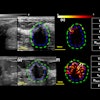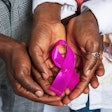Many U.S. breast imaging facilities don't have structures in place to establish an inclusive environment for transgender patients, according to a study published online June 20 in the Journal of the American College of Radiology.
A team led by Julia Goldberg of NYU Langone Medical Center assessed transgender patient care, gender inclusivity, and transgender health-related policies at breast imaging facilities across the U.S. via an email survey sent to 2,500 Society of Breast Imaging (SBI) member radiologists in January of this year.
Of 144 respondents, 78.5% said their facility has gender-neutral patient bathrooms, 9% have a separate waiting area for transgender patients, and 76.4% do not have a pink decorating scheme. However, more than half of survey participants (54.2%) said their center had displays with female gender content, Goldberg and colleagues found.
Almost two-thirds of survey respondents (58%) said their facility's intake forms do not ask patients to provide their gender identity, and 25.9% said these forms automatically populate with female phrases. Regarding electronic health records, 54.9% participants said there is no specific place to record patients' gender pronouns. Most of the survey respondents (73.4%) said their facility does not have explicit policies related to the care of transgender patients, and only 14.7% of the facilities offer lesbian, gay, bisexual, and transgender training, according to the researchers.
The survey shows that there's much more work to be done to establish inclusive breast center environments for transgender patients, the team wrote.
"Our national survey demonstrates that many breast imaging facilities do not have structures in place to consistently use patients' preferred names and pronouns, nor provide inclusive environments for transgender patients," Goldberg and colleagues concluded. "All breast imaging facilities should recognize the ways in which their practices may intensify discrimination, exclusivity, and stigma for transgender patients and should seek to improve their transgender health competencies and foster more inclusive environments."



















